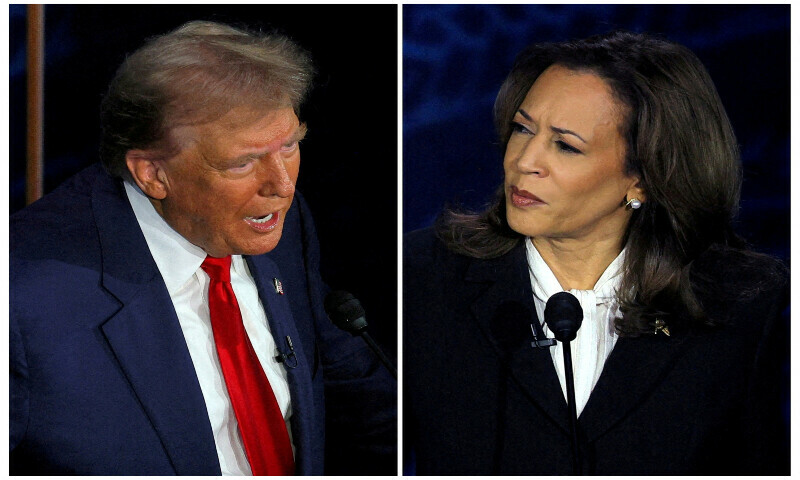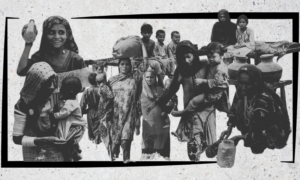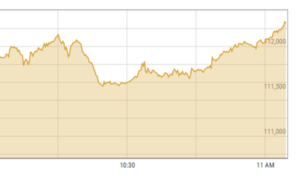The future of student visas — as well as coveted working visas and training visas — is up in the air ahead of the presidential election next week.
Four years ago, Nigerian Ernestino Amaechi got a visa to study business in the US but now he worries he might be forced to go back home and be separated from his two American-born children if visa rules are tightened after the US election.
Originally from the southern Rivers State in Nigeria, where he got his undergraduate degree, Amaechi now works as a part-time teacher at a community college thanks to a scheme that allows students to stay on after they graduate and get work experience.
But Amaechi’s Optional Practical Training (OPT) benefit, which is linked to his student visa, is about to run out.
His only chance of staying in the US is if his employers file for the highly competitive H-1B visa for skilled foreign workers in specific fields.
And as he scrambles for a solution, he’s worried that the next US president could complicate matters for him.
“I don’t get this sorted; I am in a serious mess,” he said in a phone interview from Quincy in Massachusetts.
Amaechi is one of around 50,000 students from sub-Saharan Africa who come to the US every year to study. Though China and India still send the lion’s share of students, sub-Saharan Africa is the region experiencing the most rapid growth in student flows, with an increase of 18 per cent in 2022-23.
But the future of student visas — as well as coveted working visas and training visas students can apply for after graduation — is up in the air ahead of the presidential election next week.
That’s because numerous policies — from the allocation of consular officials to process visas abroad, to the length of time students are allowed to stay and work in the US — can be altered, “with just a stroke of a pen,” by a US president, said Ben Waxman, the CEO of consulting firm Intead – International Education Advantage, which helps universities attract foreign students.
“It really does matter who is going to be president and their attitude towards international education,” he said.
Student visas have not been a hot-button topic during the election campaign and have not featured in debates between Republican candidate Donald Trump and Democrat Kamala Harris.
There was only one rather unclear — and uncharacteristic — intervention from Trump in June when, during a podcast, he said students graduating from US colleges should get a green card — or permanent resident card — to stay in the country.
The idea runs counter to his hardline stance on immigration and the campaign walked it back without further explanation soon afterwards.
Asked to comment on future policies on student visas for this article, Karoline Leavitt, the Trump campaign’s national press secretary, said the former president planned “on day one of his new administration” to shut the border and launch the largest mass deportation effort of illegal aliens in history.
“President Trump has also outlined the most aggressive vetting process ever to exclude all communists and radical Hamas supporters,” she said in an email response, adding that Trump wanted to only keep the most skilled graduates who would not “undercut American wages or workers”.
Statements like these explain why students like Amaechi are concerned about how the Nov. 5 vote could affect their prospects.
President Joe Biden’s administration has made it easier for some students to stay longer and get practical work experience after graduating, but Harris has not detailed any future policies on the campaign trail. Her team did not respond to a request for comment for this article.
Not easy
Every year, around 100,000 foreign students graduate from a US university. They are a major presence on campuses and nearly half of all graduate students in science, technology, engineering, and mathematics (STEM) come from abroad, according to the immigration advocacy group FWD.us.
For a foreign student to obtain an F-1 visa — the main student visa — they must have been admitted to a US university, demonstrate they can financially support themselves and show they plan to return to their home country after graduation, among other rules.
The average cost to attend university in the US, with tuition and other expenses included, is around $40,000.
The State Department issued nearly 450,000 F-1 visas last year.
“It’s already not an easy process,” said Sarah Spreitzer, an expert on international student policy at the American Council on Education, a non-profit that represents educational institutions.
Students can be denied visas for merely expressing an interest in staying in the US after they graduate, she said. And there’s a severely limited number of visas available for students to stay on and get practical work experience – visas like the one Amaechi has.
Competition for the H-1B visas — the one Amaechi wants — is fierce. For the upcoming fiscal year only 114,017 H-1B visas were issued after approximately 442,000 submissions — that’s just under 26pc.
During his first term in office in 2017, Trump tried to severely limit the number of H-1B visas and during the COVID-19 pandemic three years later, his administration tried to force tens of thousands of foreign students to leave the country if their schools held all classes online.
Faced with lawsuits and strong opposition from colleges and universities, the administration later rescinded the order.
While immigration policy has emerged as a major issue in the 2024 campaign, neither candidate has staked out detailed positions on international students, creating a sense of uncertainty, according to Amaechi.
“Many immigrant students or families are anxious right now,” he said.
Presidential power
An October survey of 2,492 international students by Intead and the educational company StudyPortals found that the election would not have a big impact on students’ desire to study in the US.
Only about 16pc of those surveyed said a Trump presidency would make them less likely to study in the US.
Ken Kungania, executive director of the non-profit National African Student Association, said students should inform themselves about candidates’ immigration policies before deciding where to study, recalling how previous Trump policies had targeted foreign students during Covid.
“I don’t envision the F-1 process to be killed, but the president can influence how the embassies run the selection process,” Kungania said.
Spreitzer said that the incoming president can exercise significant influence over the flow of student visas, by choking off resources to consular officials, or directing them to be especially strict in reviewing visa applications.
David Bier, director of immigration studies at the libertarian think tank Cato Institute in Washington DC, noted that denial rates for African students seeking visas to study in the US are already alarmingly high.
If Trump were to return to office, these rates could worsen, he said.
“If I were a Nigerian student under Trump, there’s still a chance you’ll get a visa, but it’s certainly the case that it’s going to become more difficult, and you might want to think about having a back-up plan,” Bier said.







